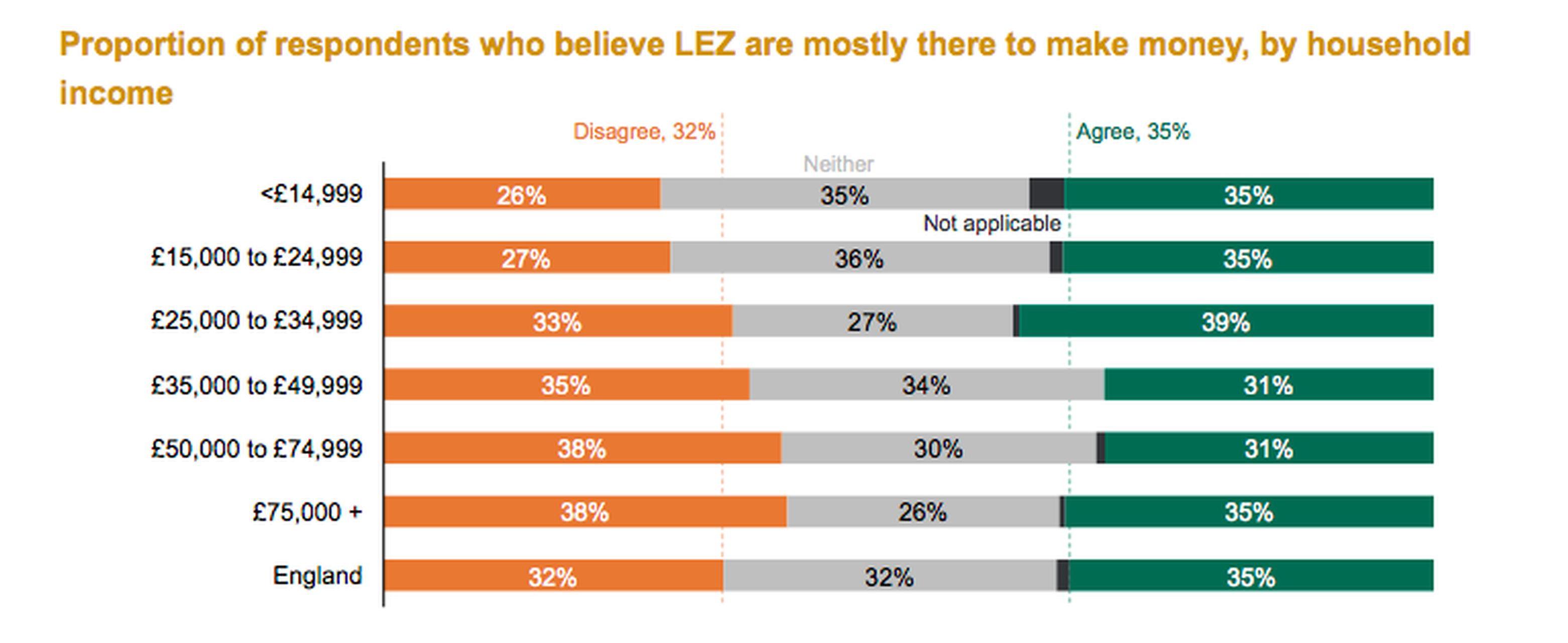

The DfT’s National Travel Attitudes Study: Wave 2 indicates that around 61% of respondents said they were in favour of Low Emissions Zones (LEZ), and 67% said that they are helping to improve people's health. In addition, 74% agreed that we should be reducing the amount we use motor vehicles for the sake of improving our health. 55% of respondents are concerned about the effect of exhaust fumes on their health. This continues the trend seen in wave 1, where issues related to the environment are generally supported by the public.
The National Travel Attitudes Study is a companion product of the National Travel Survey (NTS). Whilst the NTS provides information on the travel patterns and behaviour of individuals, the National Travel Attitudes Study (NTAS) provides information on public attitudes to travel and transport.
Wave 2 saw one single new question about the use of regular travel to improve health and fitness. Overall, 45% of respondents agreed that they use travel to improve their health and fitness, compared with 30% who disagreed.
Wave 2 also saw new questions about Low Emission Zones (LEZ), and health concerns about vehicle emissions. Over 60% of people said that they were in favour of LEZ, and that they helped to improve public health. Opinions were split however on whether the zones exist mainly to make money (35% agree, 32% disagree). Men were more likely to believe that LEZ exist mostly to make money, with 41% holding this opinion, compared to 30% of women. Individuals who are part of a household with a higher household income were more likely to disagree with the statement.
Just over half (55%) of respondents expressed concern that exhaust fumes damage personal health, and 74% agreed that motor vehicle use should be reduced for the sake of public health.
Opinions on Low Emission Zones are also strongly aligned with views on exhaust fumes and motor vehicle usage with regards public health. Overall, people who agree that exhaust fumes damage health, and that vehicle usage should be reduced for the sake of public health, are also more likely to be in favour of Low Emission Zones.
Wave 2 also saw a single question added around the impact of delivery drivers on the local area. Opinions are split amongst respondents on whether delivery drivers are causing local congestion, with 36% of people agreeing vs 34% disagreeing, with little difference between gender. In general, respondents living in rural areas are more likely to disagree that delivery drivers cause congestion in the local area. Among respondents who live in a rural village, hamlet or isolated dwelling, 44% disagree with the statement. In contrast, 29% of respondents living in urban conurbations disagree. Despite this difference in the proportions of respondents who disagree, there is little difference with regards to the numbers who agree with the statement, regardless of the area in which they live.
Wave 2 introduced five new questions regarding the ease and affordability of travel within a local area, how often people use more than one mode of transport for their journey, and how people usually travel in a week. Two-thirds (66%) of respondents reported that they find it easy to access shops using public transport.
Opinions were split with regards to ease of access via public transport for visiting friends or relatives at their home, and visiting the hospital. One third of respondents (33%) believe that it's easy to travel to work using public transport in their area, compared to 29% who find it difficult. Over one third of respondents (38%) report that they do not use public transport at all as part of their commute.
This opinion varied depending on whether the respondent lives in an urban or rural area: 43% of rural respondents use private modes to commute, versus 36% of urban respondents. There is little difference in the proportions of individuals never using public transport to access shops and to visit friends/relative whether they live in rural or urban areas. There is support amongst respondents for using more than one mode of transport when it is faster to do so, with 59% stating that they are likely to do, versus 40% who are unlikely.
Respondents were presented a series of transport modes and asked whether they used this mode during an average week, and if they used it to commute to/from work. As highlighted in the full National Travel Survey, the car remains the primary form of transport used within England.
The NTAS is an online survey which covers responses from individuals aged over 16 in England, drawn from people who have previously responded to the NTS. This release covers the second NTAS, wave 2, which was conducted during August and September 2019, and had a sample size of 2,654 individuals. Where available, data from the British Social Attitudes (BSA) Survey is provided to allow the NTAS data to continue the time series.

TransportXtra is part of Landor LINKS
© 2026 TransportXtra | Landor LINKS Ltd | All Rights Reserved
Subscriptions, Magazines & Online Access Enquires
[Frequently Asked Questions]
Email: subs.ltt@landor.co.uk | Tel: +44 (0) 20 7091 7959
Shop & Accounts Enquires
Email: accounts@landor.co.uk | Tel: +44 (0) 20 7091 7855
Advertising Sales & Recruitment Enquires
Email: daniel@landor.co.uk | Tel: +44 (0) 20 7091 7861
Events & Conference Enquires
Email: conferences@landor.co.uk | Tel: +44 (0) 20 7091 7865
Press Releases & Editorial Enquires
Email: info@transportxtra.com | Tel: +44 (0) 20 7091 7875
Privacy Policy | Terms and Conditions | Advertise
Web design london by Brainiac Media 2020